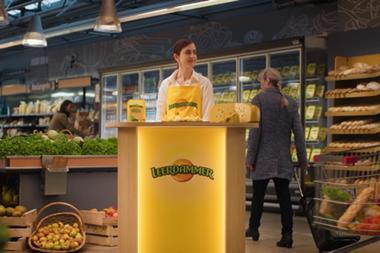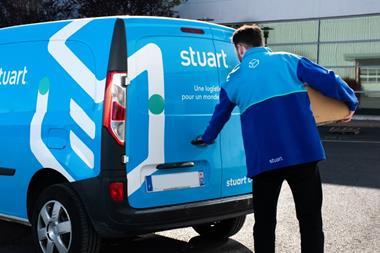Just hours into the new year, as millions of us slumped in front of the TV and contemplated the calamitous effect the season of over-indulgence had had on our health, a lifestyle revolution began.
Loud, yellow and ever-so-slightly patronising, the adverts for the government’s Change 4 Life were intended to shake us out of our festive stupor and seize the new year opportunity to change our eating habits once and for all.
The Department of Health (DoH) initiative, a response to alarming projections which foresee 60% of the population being obese by 2050 if current consumption and exercise trends continue, announced its intention to “kickstart a lifestyle revolution” across the UK through coalitions of local activists, charities, businesses and families. The emphasis is to be on making healthy choices available, and educating the public of the need for a complete dietary overhaul.
As community champions at the sharp end of the food and drink supply chain, c-stores are integral to the project. And since November, a group of stores in the North East of England have been flying the Change 4 Life banner and exploring how local stores can lodge the health message firmly in the front of their customers’ minds.
In the North East 12.5% of children aged 2–15 are obese, with a further 15.5% qualifying as overweight. Among adults, 61% of men and 60% of women are overweight or obese, with the highest prevalence in low-income areas. “We know that eating five portions of fruit and veg a day can be a tall order, particularly if you live in an area where shops don’t sell fresh fruit and veg,” said Public Health Minister Dawn Primarolo at the scheme’s launch. “Around half of secondary school pupils tend to go to their local shop on the way to or from school to buy snacks, so it’s essential they’re offered a healthy option.”
In return for a commitment to sell a wider range of fruit and vegetables and display them prominently within their stores, the 12 retailers were promised funding for new chillers and a DoH project co-ordinator to offer advice on maximising profits, minimising waste and displaying and promoting the new fresh produce to the local community. The retailers were also encouraged to link up with local initiatives, such as cooking clubs, in a bid to help their customers learn how to build fruit and vegetables into their diet.
And this is just the start. Primarolo added: “Our aim is to help up to 120 local shops in the North East to sell good fresh produce. With this scheme everyone’s a winner – people living nearby will be able to buy fresh fruit and veg and shopkeepers should see their profits soar.”
So, two months in, how are the guinea pigs faring? Pretty well is the answer, if the immaculate display inside the door of the Costcutter in Eston, Middlesbrough, is anything to go by. The 15ft cabinet boasts the Change 4 Life logo and distinctive livery, and holds a wide range of fruit and veg – a far cry from the narrow offer which was tucked away at the back of the store before the project started. “We’ve seen a massive uplift in sales,” says supervisor Linda Earl. “Customers have said how pleased they are to see fresh food here. The key is quality – our suppliers have been really good, and we work to keep the display looking its best. Our rule is, if we wouldn’t eat this ourselves, we throw it away.”
The scheme was launched to great fanfare in November, with kids from local schools brought in to the store for a lesson in the benefits of making healthy choices. The children took part in a competition to design posters promoting the scheme, and the winners’ handiwork is still on the wall.
Shop assistant Tanya Wilkinson, who spent launch day dressed as a strawberry, says the vegetables have been “flying off the shelves”, especially at weekends. “Elderly customers really appreciate the loose veg – they buy just as much as they need.”
Across the river in Hartlepool’s Headland, Premier Pricewatch serves a run-down area of closed factories and boarded up pubs near the Teesside docks. Supervisor Ruth Longwall reveals that the Change 4 Life launch was a big local affair, with representatives from the store and wholesaler Booker addressing school assemblies. “We still get kids coming in for an apple on the way to school,” she says.
Sales of fruit and veg have gone up in percentage terms, she adds, although as with the other stores which where chosen because they were underperforming in the category, that’s to be expected.
You certainly can’t miss the Change 4 Life chiller, directly opposite the entrance, but at the time of C-Store’s visit its rather dreary contents did little to promote the healthier diet. Tired bananas and mushrooms don’t whet the appetite, and certainly won’t do much to convert the junk food junkies.
This highlights the problem of selling fresh food: it requires constant attention. Regular deliveries, attractive positioning on the shelf and constant rooting out of substandard produce are time consuming tasks, and whatever promotional help they may receive from Change 4 Life, this particular investment of time and money is entirely the responsibility of the retailer and their wholesaler.
The Change 4 Life logo is incorporated into the store’s fascia, but the only related materials on show inside are some flyers inviting customers to the launch event, two months ago.
In West Cornforth, near Durham, Mick Shuib is still waiting for his display cabinet to be finished. Mick sources his produce from a local market but claims he’s had no contact with Change 4 Life since the launch day, and he’s not convinced that the project is doing all it can to change hearts and minds. “Look at the kind of incentives the confectionery suppliers give to retailers,” he says, pointing out the bagged sweets around his counter. “If the government wants kids to choose fruit over these, they’ll have to make it attractive, to the customers and to us.”
Johnny Singh in Gateshead feels, as Mick does, that support from the project organisers has been lacking since the launch. After the big day, when various dignitaries turned up at the store to grab handshakes and headlines, he feels he’s been left to his own devices. He’s also waiting for repayment of his investement in a new, branded chiller.
Although he’s seen an increase in sales of fruit and vegetables, and customers have commented on how impressed they are with the variety and quality on offer, Johnny’s retailer’s instincts are troubling him.
“I’ve reduced the range a bit and put some soft drinks into the C4L chiller, because the alternative was to split the drinks around the store, and that would affect sales,” he says.
“I’ve given a large and prominent area of the store over to this project, and I’m pleased that it’s going well. But at the same time, as a retailer I always have to think, what else could I be doing with that space?”
Loud, yellow and ever-so-slightly patronising, the adverts for the government’s Change 4 Life were intended to shake us out of our festive stupor and seize the new year opportunity to change our eating habits once and for all.
The Department of Health (DoH) initiative, a response to alarming projections which foresee 60% of the population being obese by 2050 if current consumption and exercise trends continue, announced its intention to “kickstart a lifestyle revolution” across the UK through coalitions of local activists, charities, businesses and families. The emphasis is to be on making healthy choices available, and educating the public of the need for a complete dietary overhaul.
As community champions at the sharp end of the food and drink supply chain, c-stores are integral to the project. And since November, a group of stores in the North East of England have been flying the Change 4 Life banner and exploring how local stores can lodge the health message firmly in the front of their customers’ minds.
In the North East 12.5% of children aged 2–15 are obese, with a further 15.5% qualifying as overweight. Among adults, 61% of men and 60% of women are overweight or obese, with the highest prevalence in low-income areas. “We know that eating five portions of fruit and veg a day can be a tall order, particularly if you live in an area where shops don’t sell fresh fruit and veg,” said Public Health Minister Dawn Primarolo at the scheme’s launch. “Around half of secondary school pupils tend to go to their local shop on the way to or from school to buy snacks, so it’s essential they’re offered a healthy option.”
In return for a commitment to sell a wider range of fruit and vegetables and display them prominently within their stores, the 12 retailers were promised funding for new chillers and a DoH project co-ordinator to offer advice on maximising profits, minimising waste and displaying and promoting the new fresh produce to the local community. The retailers were also encouraged to link up with local initiatives, such as cooking clubs, in a bid to help their customers learn how to build fruit and vegetables into their diet.
And this is just the start. Primarolo added: “Our aim is to help up to 120 local shops in the North East to sell good fresh produce. With this scheme everyone’s a winner – people living nearby will be able to buy fresh fruit and veg and shopkeepers should see their profits soar.”
So, two months in, how are the guinea pigs faring? Pretty well is the answer, if the immaculate display inside the door of the Costcutter in Eston, Middlesbrough, is anything to go by. The 15ft cabinet boasts the Change 4 Life logo and distinctive livery, and holds a wide range of fruit and veg – a far cry from the narrow offer which was tucked away at the back of the store before the project started. “We’ve seen a massive uplift in sales,” says supervisor Linda Earl. “Customers have said how pleased they are to see fresh food here. The key is quality – our suppliers have been really good, and we work to keep the display looking its best. Our rule is, if we wouldn’t eat this ourselves, we throw it away.”
The scheme was launched to great fanfare in November, with kids from local schools brought in to the store for a lesson in the benefits of making healthy choices. The children took part in a competition to design posters promoting the scheme, and the winners’ handiwork is still on the wall.
Shop assistant Tanya Wilkinson, who spent launch day dressed as a strawberry, says the vegetables have been “flying off the shelves”, especially at weekends. “Elderly customers really appreciate the loose veg – they buy just as much as they need.”
Across the river in Hartlepool’s Headland, Premier Pricewatch serves a run-down area of closed factories and boarded up pubs near the Teesside docks. Supervisor Ruth Longwall reveals that the Change 4 Life launch was a big local affair, with representatives from the store and wholesaler Booker addressing school assemblies. “We still get kids coming in for an apple on the way to school,” she says.
Sales of fruit and veg have gone up in percentage terms, she adds, although as with the other stores which where chosen because they were underperforming in the category, that’s to be expected.
You certainly can’t miss the Change 4 Life chiller, directly opposite the entrance, but at the time of C-Store’s visit its rather dreary contents did little to promote the healthier diet. Tired bananas and mushrooms don’t whet the appetite, and certainly won’t do much to convert the junk food junkies.
This highlights the problem of selling fresh food: it requires constant attention. Regular deliveries, attractive positioning on the shelf and constant rooting out of substandard produce are time consuming tasks, and whatever promotional help they may receive from Change 4 Life, this particular investment of time and money is entirely the responsibility of the retailer and their wholesaler.
The Change 4 Life logo is incorporated into the store’s fascia, but the only related materials on show inside are some flyers inviting customers to the launch event, two months ago.
In West Cornforth, near Durham, Mick Shuib is still waiting for his display cabinet to be finished. Mick sources his produce from a local market but claims he’s had no contact with Change 4 Life since the launch day, and he’s not convinced that the project is doing all it can to change hearts and minds. “Look at the kind of incentives the confectionery suppliers give to retailers,” he says, pointing out the bagged sweets around his counter. “If the government wants kids to choose fruit over these, they’ll have to make it attractive, to the customers and to us.”
Johnny Singh in Gateshead feels, as Mick does, that support from the project organisers has been lacking since the launch. After the big day, when various dignitaries turned up at the store to grab handshakes and headlines, he feels he’s been left to his own devices. He’s also waiting for repayment of his investement in a new, branded chiller.
Although he’s seen an increase in sales of fruit and vegetables, and customers have commented on how impressed they are with the variety and quality on offer, Johnny’s retailer’s instincts are troubling him.
“I’ve reduced the range a bit and put some soft drinks into the C4L chiller, because the alternative was to split the drinks around the store, and that would affect sales,” he says.
“I’ve given a large and prominent area of the store over to this project, and I’m pleased that it’s going well. But at the same time, as a retailer I always have to think, what else could I be doing with that space?”
Fresh start
Outside Johnny Singh’s recently refurbished Londis store in Wardley, Gateshead, a six-foot square banner announces Change 4 Life, and the fresh produce is right under the customer’s nose once they’re through the door. Johnny’s made the effort to reinforce the Change 4 Life objectives with leaflets explaining the need for a healthy balanced diet and recipe sheets, which he’s produced himself, featuring the vegetables on display.
“It’s a bit early to say whether there will be a long term change, but sales are up 60% which is very promising,” says Johnny.
“Customers see the fruit near the tills and say ‘...and I’ll take some apples for the kids’. It’s promising, but we’re not going to change habits overnight.”
Outside Johnny Singh’s recently refurbished Londis store in Wardley, Gateshead, a six-foot square banner announces Change 4 Life, and the fresh produce is right under the customer’s nose once they’re through the door. Johnny’s made the effort to reinforce the Change 4 Life objectives with leaflets explaining the need for a healthy balanced diet and recipe sheets, which he’s produced himself, featuring the vegetables on display.
“It’s a bit early to say whether there will be a long term change, but sales are up 60% which is very promising,” says Johnny.
“Customers see the fruit near the tills and say ‘...and I’ll take some apples for the kids’. It’s promising, but we’re not going to change habits overnight.”
Top of the agenda
The 12 stores involved in the pilot project were chosen by the Association of Convenience Stores (ACS) with the support of Spar, Costcutter, Booker, Londis, Mills Group and Nisa, with the North East chosen as the template region because of its poor general health record compared to other parts of the country.
The Department of Health has put aside £800,000 over three years to fund the project, which will roll out to 120 stores in the region by May.
Project co-ordinator Stephanie Rice says that the scheme is already showing retailers that fruit and veg can work for them as impulse items. “They are all very enthusiastic and engaged, and some who were quite sceptical realise that although the category is hard work, and change won’t come overnight, it’s something that customers want.”
Rice says that there has been a dip in sales in some stores since the launch but adds that Change 4 Life is now conducting a review of the first eight weeks of the project and developing a marketing plan. A calendar of events based around the participating stores will keep the momentum going over the coming months.
Change 4 Life will also distribute promotional materials in the near future, she adds, and stores will be reimbursed for the costs of equipment once they have submitted all the necessary information and invoices.
“Retailers should be reassured that this is an ongoing programme,” she says. “The government has committed to it and Change 4 Life is right at the top of the agenda.”
North East stores with an interest in joining the project should make contact through their symbol group or wholesaler.
The 12 stores involved in the pilot project were chosen by the Association of Convenience Stores (ACS) with the support of Spar, Costcutter, Booker, Londis, Mills Group and Nisa, with the North East chosen as the template region because of its poor general health record compared to other parts of the country.
The Department of Health has put aside £800,000 over three years to fund the project, which will roll out to 120 stores in the region by May.
Project co-ordinator Stephanie Rice says that the scheme is already showing retailers that fruit and veg can work for them as impulse items. “They are all very enthusiastic and engaged, and some who were quite sceptical realise that although the category is hard work, and change won’t come overnight, it’s something that customers want.”
Rice says that there has been a dip in sales in some stores since the launch but adds that Change 4 Life is now conducting a review of the first eight weeks of the project and developing a marketing plan. A calendar of events based around the participating stores will keep the momentum going over the coming months.
Change 4 Life will also distribute promotional materials in the near future, she adds, and stores will be reimbursed for the costs of equipment once they have submitted all the necessary information and invoices.
“Retailers should be reassured that this is an ongoing programme,” she says. “The government has committed to it and Change 4 Life is right at the top of the agenda.”
North East stores with an interest in joining the project should make contact through their symbol group or wholesaler.































No comments yet